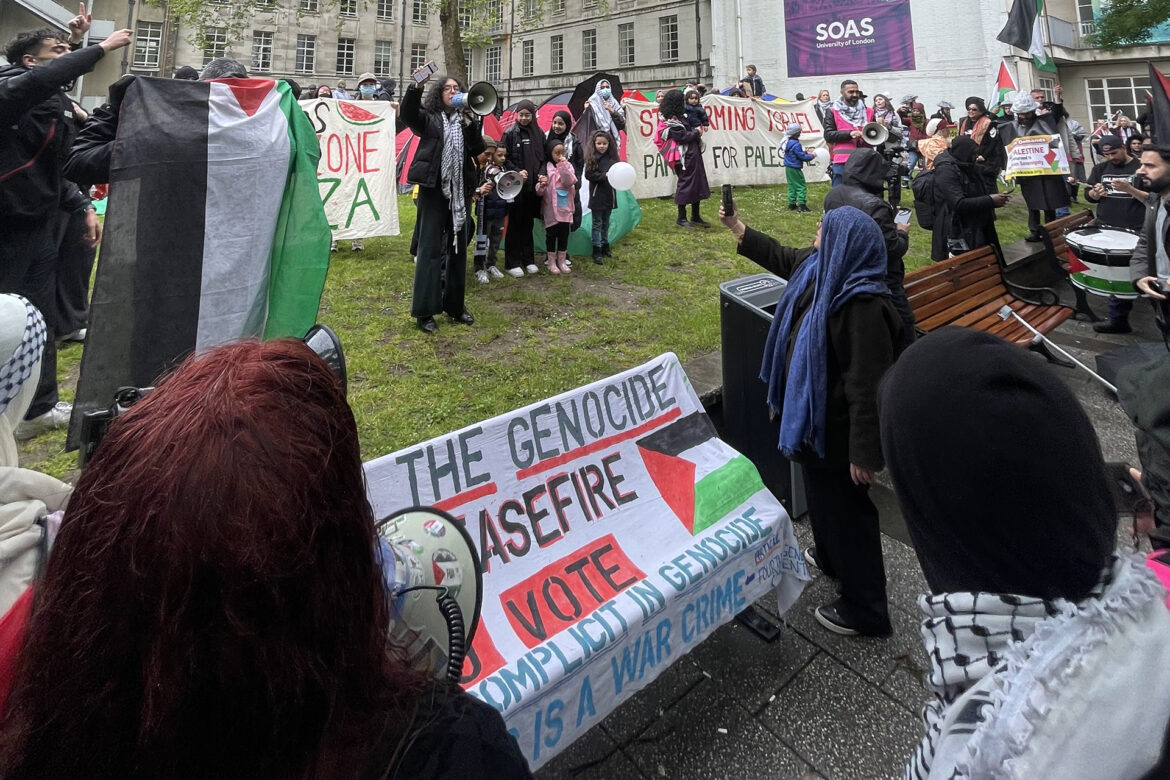Tel Aviv Tribune Net correspondents
London- Although the British government has not intervened – so far – forcefully to prevent sit-ins at British universities, as happened in the United States and other European countries, Prime Minister Rishi Sunak held a meeting with the deputy deans of the universities concerned, with the aim of urging them not to tolerate what he described as “anti-Semitism.” Against Jewish students on campus.
This meeting, which was attended by institutions that say they defend the rights of Jews in Britain, came under pressure from the pro-Israel lobby, which promotes the narrative of an increase in anti-Semitic behavior in British universities, against the backdrop of the spread of pro-Palestine camps.
Despite this lobby’s inability to prove any incident showing that Jewish students were exposed to hate crimes on university campuses, the government responded to the request of Jewish institutions and issued strict instructions not to tolerate what the British Prime Minister considered “anti-Semitism” or “fears of provoking violence” within universities.
Exaggerated response
Despite the widespread spread of the camps in 14 British universities, including the most important universities in the country such as the University of Oxford and the University of Cambridge, they did not record any incidents of violence, attacks, or any “anti-Semitic” behavior. Rather, these camps enjoy support from the academics and graduates of these universities, as did More than 170 academics from the University of Oxford sent a letter declaring their support for the camp set up at the university in solidarity with Palestine.
Despite this, British Prime Minister Rishi Sunak’s meeting with British university officials gives a distorted picture of these camps, by talking about the need to avoid violence and intolerance of anti-Semitism, as well as protecting Jewish students on university campuses.
The British Ministry of Education also announced that it is working on a new plan to combat “anti-Semitism” at the university, and to develop a charter that all universities are obligated to respect to protect Jewish students.
Political bidding
For his part, Professor Gilbert Al-Ashqar, Head of the Department of International Relations at the University of Oriental and African Studies (SAOS), which was one of the first universities to establish a solidarity camp with Palestine, believes that the British context differs greatly from its counterpart in the United States, although the motives The student movement is the same.
Gilbert explains this difference by the fact that British universities are not homogeneous, given that there is an advanced position of some university presidents who considered student sit-ins acceptable as long as it adheres to the rules of peaceful demonstration, and allows students a space to express their positions on campus, despite the increasing government pressure on university presidents. .
Regarding the Prime Minister’s meeting with university officials, the British academic, speaking to Tel Aviv Tribune Net, believes that the purpose of promoting the narrative of “the rise in anti-Semitism” is to prevent any criticism of Israeli policies and the ongoing crime of genocide in Gaza, and he considered that what the Prime Minister is doing “falls within the context of bidding.” “The electoral campaign pursued by the Conservative Party, to court the right wing and improve its results in the upcoming parliamentary elections.”
Professor Gilbert ruled out that the British police would intervene – similar to the American scenario – to disperse these camps, because “the differences regarding the position on the Palestinian issue are fundamental, and in Britain there is a broad public that supports the Palestinian issue.”
He added that the history of political liberalism in Britain makes the tradition of respect for freedom of opinion and expression deeply rooted. He added that “supporters of the Palestinian cause – in an election year like the one we are witnessing – have become a clear electoral force that influences the political path, and its influence is taken into account, and this is what we witnessed during the recent municipal elections.” “.
Legitimate demands
For his part, the head of the Palestinian Student Activities Association in Britain, Adnan Qasad, rejected the accusations that the student movement is anti-Semitism, stressing that this movement focuses on clear demands directed by the students to their universities, and begins with withdrawing university investments from the military companies that the Israeli government uses to commit genocide against the Palestinians, and they demand that their universities condemn Public and public awareness of war crimes committed by Israel, and protection of freedom of expression for students supporting the Palestinian cause.
As for how universities deal with protesting students, Qassad confirmed – in his speech to Tel Aviv Tribune Net – that the treatment differs from the American dealing with student protests, as students always seek to negotiate with the university administration to meet their demands, and they may face some challenges at times, such as restrictions on some activities. By security personnel, but without recording any incidents of violent intervention, indicating that the students are continuing to work towards achieving their goals in peaceful ways.
Qassad confirmed that there is coordination between the various sectors of the student movement, with the aim of achieving their common goals, even in the long term. He stated that they are receiving support, which he described as “extraordinary,” from citizens and passers-by next to the universities. Some volunteers even provide food to the students in the camps, adding that “morale The number of students participating in these camps is very high, and there is an insistence on not stopping until the demands are met.”



